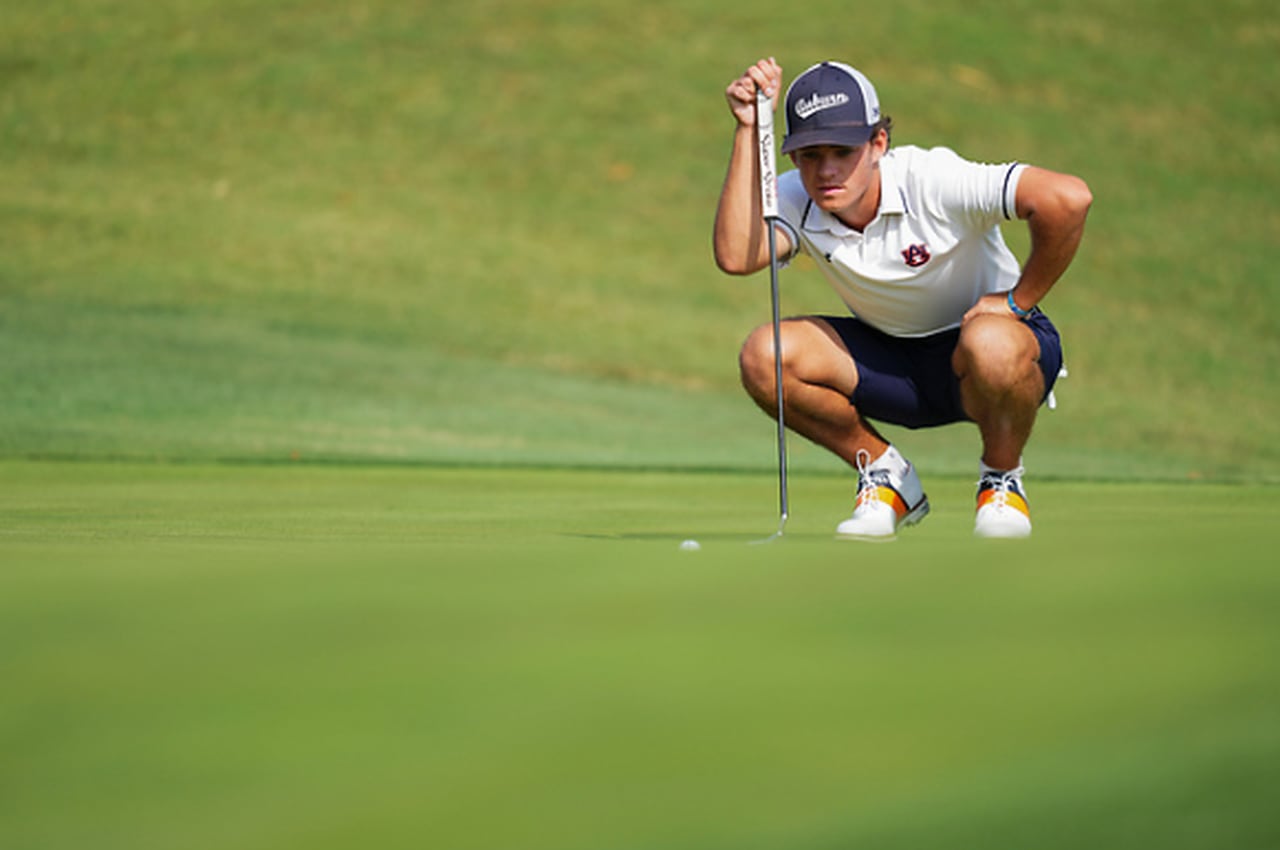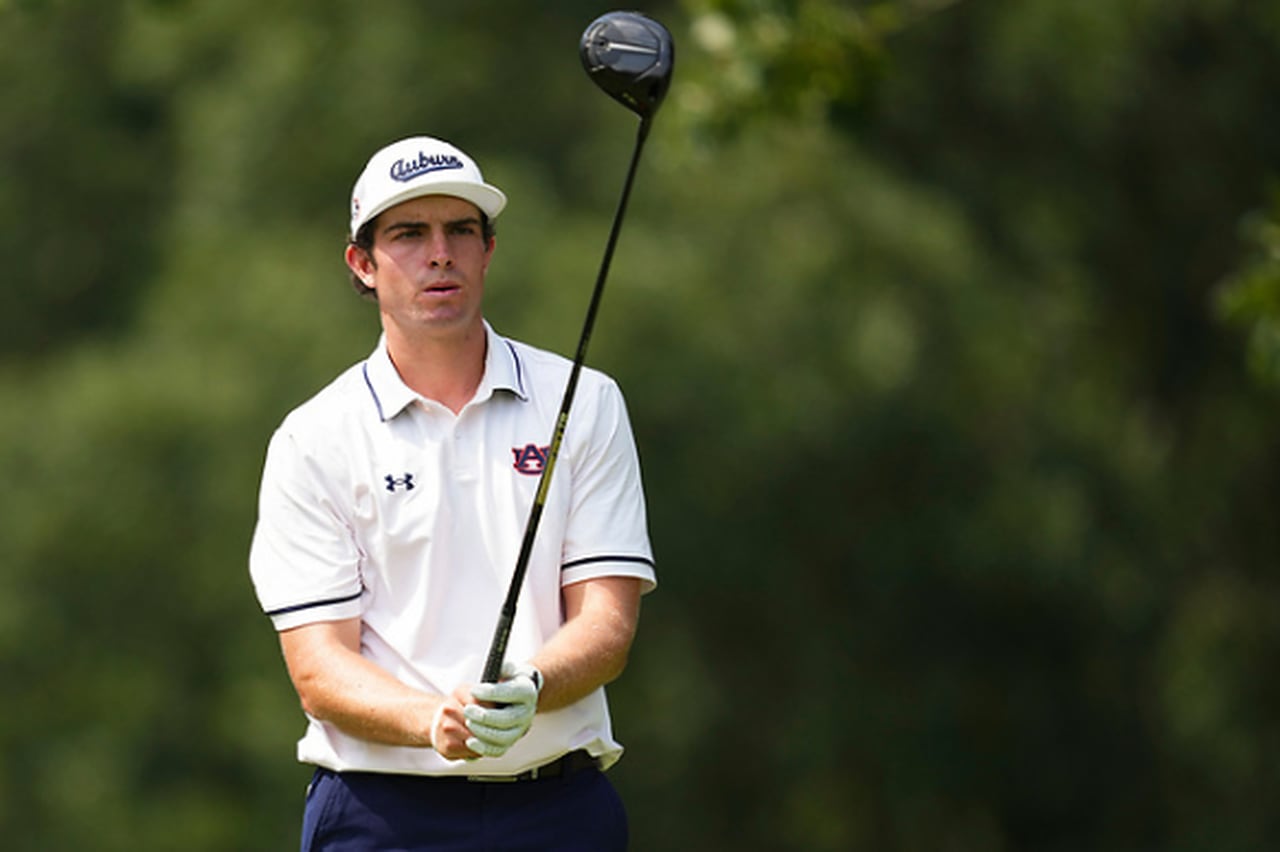Why PGA TOUR U is reshaping how Auburn develops, recruits its top-ranked golf team
It’s a lonely game in the middle of the fairway, no caddy for guidance, only a small assortment of parents looking on from around the trees. It leaves a golfer with a club in their hand and a mind trying to compartmentalize their next shot, their opponent alongside them and how it all fits into the greater picture of that week’s team competition.
Then add the money on the line and the future’s at play in a quickly evolving college golf world. It’s changed the composition of what swirls through a golfer’s mind and changed the job for Auburn head coach Nick Clinard. For all he’s built during his 15 years here, he has not ever seen change like the last three years. The objectives are different now.
He recruits golfers who plan to play professionally. But the road there is arduous and complicated. Developing golfers to take their next step was done so knowing the math just doesn’t work in their favor.
At least until 2020. While still a difficult process, the PGA Tour introduced PGA Tour University, meant to take advantage of an ever-growing talent pool in college golf during the sport’s biggest wave of growth in interest and capital in decades. It’s meant to provide both more and simpler options to reach the professional ranks.
The priority for Clinard and his players is the team. But to say a team championship alone is a priority would be naive. College golf is evolving.
“It’s all about the big picture, too,” Clinard said. “These guys want to play on Tour. It’s not about next week, it’s not about the week after, it’s about preparing these guys for life and the PGA Tour so when they leave here they’re ready to go.”
What is PGA Tour U?
There is so much talent in college golf these days, but the route to get that talent in front of the television audiences to appreciate it is complicated. Other sports have direct methods from college to the pros like the NFL Draft. Golf doesn’t.
So Brendan von Doehren created PGA Tour University.
“Golf never had that existed until PGA Tour University, that is the form of that,” von Doehren said. “It’s a direct connection between elite collegiate players and our system.”
Drafts in other sports, von Doehren said, are subjective. While there are 259 players selected in the NFL Draft and each, should they sign their contracts, will immediately go practice with their new team in hopes of making the roster, PGA Tour U is a fully merit-based system.
Throughout their college career, players accumulate points based on their performance in collegiate and amateur events. The final standings are recorded each year in May after the NCAA Championships and the top player in the ranking earns a PGA Tour membership card for the remainder of that ongoing season and the following year.
In May 2023, Texas Tech’s Ludvig Aberg became the first golfer to earn his Tour card through PGA Tour U. Aberg then parlayed his play into a spot on the European Ryder Cup team in Rome this fall.
The rest of the top five earn a spot on the Korn Ferry Tour for that year’s season and into the final stage of Qualifying School — a collection of tournaments used to earn membership on the PGA Tour.
Those ranked No. 6-10 receive conditional status on the Korn Ferry Tour and into the PGA Tour Americas. Players No. 11-25 just get into PGA Tour Americas as of a Dec. 12 update. Additionally, the Division II national player of the year will get the same benefits as Division I golfers finishing between No. 11-25.
All players ranked No. 6-25 skip directly to the second round of Qualifying School.
Those rankings, too, will only include seniors as the system is designed in that upperclassmen are likely to be the only ones capable of accumulating enough points.
That said, von Doehren created an accelerated track for underclassmen in 2022. If a player reaches a 20-point threshold in that program, they get a PGA Tour card. In October 2023, Vanderbilt’s Gordon Sargent, a former Alabama high school state champion, became the first golfer to earn a card through the accelerated program. He is still playing for Vanderbilt this year. His PGA Tour card awaits whenever he chooses to turn professional.
Golfer Gordon Sargent walks down the second fairway during the Par 3 contest on Wednesday, April 5, 2023, at Augusta National Golf Club in Augusta, Ga.(Photo by Andrew Redington/Getty Images)
“As much (as) it’s strengthened pro golf and our PGA Tour, as we look at ourselves first, this has strengthened college golf tremendously,” von Doehren said. “This has changed the ballgame of why do you come to America. Do you come to get an education? Do you come because of PGA Tour U? Do you come because of that direct pathway? It’s keeping kids in school longer.”
More elite golfers are going to college now, instead of directly joining the professional ranks out of high school solely in search of the PGA Tour. The choice now is similar to top high school baseball players going to college instead of the MLB Draft. Why spend time making very little money in minor league baseball compared to coming to college and having “the best resources, eat the best food, around the best competition and you’re not in a rush to get to into the real world of pro golf,” von Doehren said.
It means a system where golfers are more prepared to play on Tour when they leave college. It means an improved world of college golf.
The players are noticing.
“Having the PGA Tour U, it’s unbelievable for guys like us,” Auburn junior Brendan Valdes said. “It proves guys like Ludvig, he can go out there and immediately be competing. He made the Ryder Cup. I feel like that’s really good for us, to show that we can do it.”
A new golf world in Auburn
He says he isn’t focused on it right now, but Jackson Koivun’s path is paved. The freshman is already a top-25 ranked amateur in the world, and was the top-rated high school player in his class.
Koivun has only played one semester of college golf where he’s already been a two-time SEC Golfer of the Week. He beat Sargent at the SEC Fall Preview in 19 holes.

Jackson Koivun during the match between the Auburn Tigers and the Vanderbilt Commodores at Country Club of Birmingham in Birmingham, AL on Wednesday, Sept. 27, 2023.Jamie Holt/Auburn Tigers
For a player of his caliber, the name on the front of his collared shirt won’t matter much for his professional track. A golfer of his talent who began playing in tournaments when he was 5, playing professionally wasn’t a dream. A dream would imply it wasn’t realistic.
He’s years off from competing for a PGA Tour card in the standard or accelerated program. So Koivun said his mind is more tuned to making his first Walker Cup team — a competition similar to the Ryder Cup between amateur American and British golfers.
Koivun is trying to be a normal freshman, fitting laundry days into his schedule and showing a commitment to school. Part of why he picked Auburn, a school without a golf national championship, was its academic opportunities in case a golf career doesn’t work out.
“I’m definitely paying attention to it,” Koivun said of PGA Tour U. “I think it’s going to be a little different by the time I get to junior, senior. I think there’s going to be even more opportunities than there are now because of how good some of the PGA Tour U guys are doing on Tour and how good the seniors are playing now. I think it’s going to open the eyes of people on the PGA Tour.”
Koivun suggested the PGA should consider adding more than one Tour card at the end of a season. He’ll be there someday, but it doesn’t have to be top of mind now.
Those rankings mean much more to an experienced golfer like senior J.M. Butler.

.M. Butler during the match between the Auburn Tigers and the Vanderbilt Commodores at Country Club of Birmingham in Birmingham, AL on Wednesday, Sept. 27, 2023.Jamie Holt/Auburn Tigers
As of the Nov. 29 rankings, Butler is 23rd — just outside of a qualifying spot. Butler made a deep run in the 2023 U.S. Amateur, taking a three-up lead to the back nine of his semifinal match against Ohio State’s Neal Shipley before losing five of the final seven holes.
He said he plans to turn professional no matter what after his senior season.
But right on the bubble of the top 20, he sits on the precipice of an opportunity to make his professional journey far easier.
“That would be a big help, especially turning pro right away and not having to worry about Q School cause Q School can be very tough,” Butler said.
If Butler fails to make the top 20, he joins every other golfer entering Q School through the pre-qualifying round. Should he advance through that stage, he’d also have to get through the first round just to get to the same round he’d gain automatic entry into by finishing in the PGA Tour U top 20. There’s time and money at stake.
Being on that precarious border, Butler and other golfers emphasize trying to ignore the pressure of their future and focus just on their individual college events. Play well in those events, Butler said, and the rankings will take care of themselves.
“They just know that there’s more money out there,” Clinard said. “I think guys will play professional longer maybe than they used to because of that reason. The end can be really, really good, the end game. The reality is just continuing to prepare them and give them statistics and give them the analytics of the PGA Tour. This is what these guys are able to do in this area of their games.”
Compared to his team trying to stay focused on the season at hand, Clinard is more in tune with how to make his coaching means reach the players’ desired ends.
“In my opinion, if he doesn’t prepare us to go pro, then we’re not going to be able to beat the other guys,” Valdes said. “If we’re not ready to go pro, then you’re not going to beat the top college guys. It’s a think that he almost has to do to make sure he can have the best team in the country.”
Clinard said his recruiting pitch to players has changed with a focus now on not just winning, but how to get them on Tour. Once the players are in Auburn, he teaches them not just to be a better golfer, but how to manage their time, how to choose a place to live, how to pick an agent and how to build a life without the hand of a college program to guide.
“It gives hope, it gives ambition for these people to go out and work hard. Anything is possible if they play well. I think Covid was a great thing for golf. It’s great for all the clubs across the country. I think they’ve really, really grown and a lot more people are playing golf. I think it’s been very healthy for our sports, it’s been healthy for growing the game.”
Matt Cohen covers Auburn sports for AL.com. You can follow him on X at @Matt_Cohen_ or email him at [email protected]
